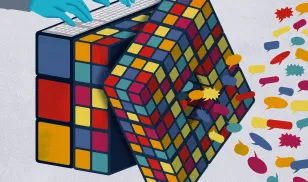


Myanmar
Myanmar’s already-stalled democratic transition was derailed in February 2021, when the military seized control of the government. Protesters, journalists, activists, and ordinary people risk criminal charges, detention, and lethal violence for voicing dissent against the military. Millions of people remain displaced or have been newly displaced by violence, including hundreds of thousands of Rohingya, a mostly Muslim ethnic minority
Research & Recommendations
Myanmar
| PR Political Rights | 0 40 |
| CL Civil Liberties | 7 60 |
Overview
Military commanders seized control of Myanmar’s government in February 2021, ending a period of power sharing between military and civilian leaders under a 2008 constitution that had been drafted by a previous junta. Since the coup, the military has violently suppressed peaceful civic dissent and battled a sizable armed resistance movement that has widespread popular support and includes militias associated with various ethnic minority groups. The National League for Democracy (NLD), which led the civilian government before the coup and won a sweeping victory in the November 2020 elections, serves as the political backbone of a self-declared National Unity Government (NUG). Armed resistance groups with ties to the NUG exercise partial or effective control over a growing swathe of territory outside major population centers. Millions of people remain displaced or have been newly displaced by the ongoing civil war, with many seeking refuge abroad.
In countries where democratic forces have come to power after periods of antidemocratic rule, the new governments should pursue an agenda that protects and expands freedoms even as it delivers tangible economic and social benefits to citizens.
These countries must act swiftly to release all political prisoners, build or revitalize democratic institutions, reform police and other security forces, organize and hold competitive multiparty elections, and ensure accountability for past human rights violations.
In countries where there has been significant erosion of political rights and civil liberties, policymakers, legislators, jurists, civic activists, and donor communities should work to strengthen institutional guardrails and norms that serve to constrain elected leaders with antidemocratic or illiberal aims.
Myanmar
| A Obstacles to Access | 2 25 |
| B Limits on Content | 5 35 |
| C Violations of User Rights | 2 40 |
Political Overview
Military commanders seized control of Myanmar’s government in February 2021, ending a period of power sharing between military and civilian leaders under a 2008 constitution that had been drafted by a previous junta. Since the coup, the military has violently suppressed peaceful civic dissent and battled a sizable armed resistance movement that has widespread popular support and includes various armed ethnic minority groups. The National League for Democracy (NLD), which led the civilian government before the coup and won a sweeping victory in the November 2020 elections, serves as the political backbone of a National Unity Government (NUG). Armed ethnic groups and resistance groups with ties to the NUG exercise partial or effective control over a growing swathe of territory. Millions of people remain displaced or have been newly displaced by the ongoing civil war, with many seeking refuge abroad.
Freedom of expression online has been and is increasingly under attack as governments shut off internet connectivity, block social media platforms, and restrict access to websites that host political, social, and religious speech. Protecting freedom of expression will require strong legal and regulatory safeguards for digital communications.
Governments should encourage a whole-of-society approach to fostering a high-quality, diverse, and trustworthy information space. The Global Declaration on Information Integrity Online identifies best practices for safeguarding the information ecosystem, to which governments should adhere.
Comprehensive data-protection regulations and industry policies on data protection are essential for upholding privacy and combating disproportionate government surveillance, but they require careful crafting to ensure that they do not contribute to internet fragmentation—the siloing of the global internet into nation-based segments—and cannot be used by governments to undermine privacy and other fundamental freedoms.



